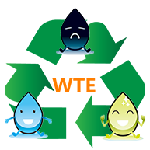
Integrated bioenergy production from municipal wastewater stream by In-N-Out WTE
 Climate Colab Aug 13, 2014 03:19 |
Thank you for submitting a proposal to the Climate CoLab.
This is a thorough and well-presented proposal, which presents an approach to grease in waste water that could effectively impact the reduction of GHG emissions.
For your revisions, we would like to see more information that addresses the workability of the project; specifically, it will make for a much more impactful proposal if you could be very detailed about where you intend to pilot and what kind of by-in you have from community partners (i.e. a local waste treatment company and/or the municipal government). Thus far the only thing mentioned is that it will be piloted in the US.
Additionally, we think it would be interesting to imagine how you might adapt and apply this technology to low-income countries.
|
 Qingshi Tu Aug 19, 2014 10:30 | Proposal contributor
Dear Judge,
Thank you for your time to review our proposal and we sincerely appreciate your comments. We've updated our proposal with a much more detailed plan for the implementation of the first pilot system. The implementation plan can be found in the section "Where will these actions be taken?"
Regards
|
 Climate Colab Sep 12, 2014 12:02 |
This is a very interesting, imaginative and potentially impactful idea. The one concern is, what you're proposing is very difficult; can you really pull it off? The fact that you already have a partnership with the City and some funding is very promising -- it's critical (and reassuring to me) that you have secure partnerships.
After the pilot in Cincinnati, I'd like to see this project in a major city of a middle income country -- Mexico City perhaps, or Bombay. Many low income countries have such little infrastructure that this would be very hard to pull off.
Good luck during the voting period!
|
 Qingshi Tu Sep 14, 2014 05:40 | Proposal contributor
Dear Judge,
Thank you very much for your comments. Similar concerns about the feasibility of the proposal were raised by judges when the team was involved in other competitions. We understand that the implementation may be a challenge to the places where little infrastructure exists. Our solution is to address the challenge from both planning and financial perspectives. The concept of integrated bioenergy generation will be included in the planning of the new infrastructure and the existing successful implementation cases (e.g. the project in Cincinnati) will be used as the reference. In addition to governmental loans and private investments, the project may also benefit from a variety forms of fund raising, including: bonds, community-based investment, environmental liability cost of the investment, etc. For example, the residents of a community may form a board of trustee to invest their money in part of the project. In return, the residents can have reduced service fees for (or even free) the municipal services (e.g. trash collection). Dependent on the negotiation, the residents may also receive dividend from the profit of the project. The fund for the project may also come from charging mandatory environmental liability cost for the investors who will build facilities that will generate significant amount of wastewater and/or other emissions. The cost can be a one-time fee based on the scale of the investment and/or a re-occurring fee based on the operation (or other factors, such as sales) of the business. The cost can also be in a form of loans that will be paid back to the investors after a certain period of time. Depending on the legislation of the country, one or more of these fund raising approaches may be taken to cover the initial investment.
|
 Jan Kunnas Sep 15, 2014 12:15 |
Hi, interesting proposal. Could you please, explain the benefit of collecting just the grease, instead of for example just make bio gas out of all organic waste? Or am I misunderstanding your proposal?
|
 Qingshi Tu Sep 15, 2014 01:51 | Proposal contributor
Hi Jan-k,
Thank you for your question. There are several advantages of separating FOG over sending all organic waste to an AD:
1) diversified end product profile. Biodiesel is a renewable fuel that has a large market and mature application. Many car manufacturers support the use of biodiesel blend (with petrochemical diesel) up to 20% by volume.
2) there will be potentially an inhibitive effect on methane generation when the amount of FOG in the organic waste goes beyond a certain level. So separating FOG helps to avoid this potential risk.
3) better energy utilization. The efficiency of converting the energy embedded in FOG is reported to be higher for biodiesel than for biogas.
Hope this answers your question :)
|